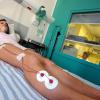MWE recently launched its revolutionary new product Sigma MM Molecular Medium, which renders pathogenic material safe within seconds by killing any bacteria and viruses, while preserving intact DNA and RNA ready for molecular analysis.

Sigma MM is a powerful reagent-based liquid medium, safe and stable for transport at ambient temperature. It is effective for bacteria, including mycobacteria, fungi, and viruses. Nucleases are inactivated. Analysis can be performed locally, but the specimen is also rendered safe for long distance national or international transportation.
Effective rapid killing has been demonstrated for bacteria, including Mycobacterium tuberculosis, Escherichia coli, and Staphylococcus aureus, and viruses including Influenza A and B.
Image credit | iStock



